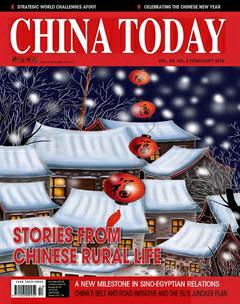Greetings to Our Readers
Spring Festival, also known as Chinese New Year, falls on February 8 this year. It is traditional for Chinese people, no matter where they are, to return home and have dinner with family members on New Years Eve. Grandparents, parents, brothers and sisters get together, look back on the past year and envision the future. Spring Festival has always been the most important holiday for the Chinese both at home and abroad.
It seems difficult for many foreigners to comprehend Chinese peoples reverence for this day. It forms part of their spiritual world and the value they accord family and kinship. This explains the heavy road, rail and air traffic around Spring Festival. Each year, from a few weeks before the holiday to 40 days after it is celebrated, millions of people travel back to their hometowns to visit family.
Spring Festival is also celebrated in Asian countries influenced by traditional Chinese culture, such as Vietnam, South Korea, Singapore and Japan. It is also an official holiday in North Korea, Mongolia, Malaysia, Indonesia, Thailand, Myanmar, Brunei, and Bhutan.
In recent years, countries outside Asia have started celebrating this holiday as well. State leaders in places such as the U.S., Russia, the U.K., Brazil, and Canada extend their greetings to the Chinese people on this occasion. It is notable that Spring Festival has been declared a national holiday even in countries far from China – Mauritius in Africa and Surinam in South America, to name but a few.
The world shows its positive and welcoming attitude toward the rise of China by the widespread celebration of Spring Festival. In addition to being the worlds second largest economy, the biggest trading nation, and a major country in outbound investment, China promotes global progress through its strong economys broad market and development opportunities.
Over the past three decades, China contributed, on average, 13.5 percent to world economic growth. In 2014, its economy contributed 27.8 percent to global growth – ranking first worldwide. Its outbound investment exceeded US $100 billion in the past two years, most of which was earmarked for infrastructure projects badly needed in developing countries. It thus also generated jobs locally. In addition, the number of tourist departures from the Chinese mainland exceeded 100 million in 2014. These travelers have stimulated the world economy to some extent.
China pursues a new type of international relationship featuring mutually beneficial cooperation and equality among all countries, whether big or small. It strives for fairness and to make inter-country interests compatible, gives priority to justice while working hard to strengthen unity and cooperation with other developing countries, and safeguards their legitimate rights and interests. Such contributions are widely appreciated.
The growing popularity of Spring Festival abroad also reflects the rich history and fascination of traditional Chinese culture. In an ever-diversifying world community, the distinct appeal of Chinese culture offers potential solutions from an Eastern perspective to the challenges people today face. For instance, philosophies such as cherishing peace, building a harmonious society, and seeking harmony in diversity can contribute to eliminating racial discrimination and reducing conflicts.
Nevertheless, misunderstanding, misreading and misjudgments often occur when China communicates with the world, due to differences in social systems, political party systems, legal systems, and cultural backgrounds. Some contradictions between China and Latin America, for example, can be attributed to insufficient understanding amid overly rapid development of bilateral ties. The world aspires to learn more about China – we can tell from the popularity of Spring Festival.
As the 21st century unfolds, China is making itself better known to the world. Today, it is not unusual to read Chinese leaders articles, articulating the nations stance, published in mainstream foreign media. Officials and scholars from China have also become more confident about speaking at international conferences and academic symposiums. Moreover, Confucius Institutes established worldwide have promoted the culture and people of China overseas, while enhancing mutual understanding and friendship.
We would like to see more people show interest in China, and hope they can learn the realities of this country by paying a visit, studying the Chinese language, and making Chinese friends.
The entire staff at China Today wish you, no matter where you are, health and happiness throughout the New Year!
- CHINA TODAY的其它文章
- Greetings to Our Readers

